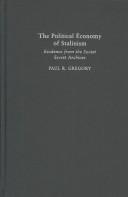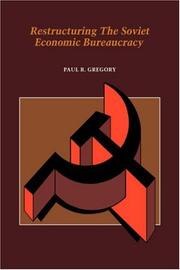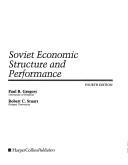| Listing 1 - 7 of 7 |
Sort by
|

ISBN: 0521826284 0521533678 9780521533676 9780521826280 9780511615856 0511062575 9780511062575 051112144X 9780511121449 051161585X 9780511071034 0511071035 1280161442 9781280161445 9786610161447 6610161445 1107137977 9781107137974 0511205910 9780511205910 0511308663 9780511308666 0511106378 Year: 2004 Publisher: Cambridge : Cambridge University Press,
Abstract | Keywords | Export | Availability | Bookmark
 Loading...
Loading...Choose an application
- Reference Manager
- EndNote
- RefWorks (Direct export to RefWorks)
This book uses the formerly secret Soviet state and Communist Party archives to describe the creation and operations of the Soviet administrative command system. It concludes that the system failed not because of the 'jockey'(i.e. Stalin and later leaders) but because of the 'horse' (the economic system). Although Stalin was the system's prime architect, the system was managed by thousands of 'Stalins' in a nested dictatorship. The core values of the Bolshevik Party dictated the choice of the administrative command system, and the system dictated the political victory of a Stalin-like figure. This study pinpoints the reasons for the failure of the system - poor planning, unreliable supplies, the preferential treatment of indigenous enterprises, the lack of knowledge of planners, etc. - but also focuses on the basic principal-agent conflict between planners and producers, which created a sixty-year reform stalemate.
Economic order --- Russian Federation --- Bureaucracy --- Bureaucratie --- History --- Histoire --- Soviet Union --- URSS --- Economic conditions --- Politics and government --- Conditions économiques --- Politique et gouvernement --- Russia --- Conditions économiques --- Interorganizational relations --- Political science --- Public administration --- Organizational sociology --- Советский Союз --- Ber. ha-M. --- Związek Socjalistycznych Republik Radzieckich --- ZSRR --- Związek Socjalistycznych Republik Sowieckich --- ZSRS --- Szovjetunió --- TSRS --- Tarybų Socialistinių Respublikų Sąjunga --- SRSR --- Soi︠u︡z Radi︠a︡nsʹkykh Sot︠s︡ialistychnykh Respublik --- SSSR --- Soi︠u︡z Sovetskikh Sot︠s︡ialisticheskikh Respublik --- UdSSR --- Shūravī --- Ittiḥād-i Jamāhīr-i Ishtirākīyah-i Shūrāʼīyah --- Russia (1923- U.S.S.R.) --- Sovetskiy Soyuz --- Soyuz SSR --- Sovetskiĭ Soi︠u︡z --- Soi︠u︡z SSR --- Uni Sovjet --- Union of Soviet Socialist Republics --- USSR --- SSṚM --- Sovetakan Sotsʻialistakan Ṛespublikaneri Miutʻyun --- SSHM --- Sovetakan Sotsʻialistakan Hanrapetutʻyunneri Miutʻyun --- Unión de Repúblicas Socialistas Soviéticas --- Berit ha-Moʻatsot --- Rusyah --- Ittiḥād al-Sūfiyītī --- Rusiyah --- Rusland --- Soṿet-Rusland --- Uni Soviet --- Union soviétique --- Zȯvlȯlt Kholboot Uls --- Związek Radziecki --- ESSD --- Sahaphāp Sōwīat --- KhSHM --- SSR Kavširi --- Russland --- SNTL --- PSRS --- Su-lien --- Sobhieṭ Ẏuniẏana --- FSSR --- Unione Sovietica --- Ittiḥād-i Shūravī --- Soviyat Yūniyan --- Russian S.F.S.R. --- Business, Economy and Management --- Economics

ISBN: 0521363861 0521032687 0511664400 Year: 1990 Volume: vol *2 Publisher: Cambridge : Cambridge University Press,
Abstract | Keywords | Export | Availability | Bookmark
 Loading...
Loading...Choose an application
- Reference Manager
- EndNote
- RefWorks (Direct export to RefWorks)
In Restructuring the Soviet Economic Bureaucracy, Paul R. Gregory takes an inside look at how the system worked and why it has traditionally been so resistant to change. Gregory's findings shed light on a bureaucracy that was widely considered the greatest threat to Gorbachev's efforts at perestroika, or restructuring. Restructuring the Soviet Economic Bureaucracy is based on Soviet and Western published accounts as well as interviews with former members of the Soviet economic bureaucracy, mainly from the middle elite. These informants, with their expert knowledge of the system, tell how bureaucrats big and small made the routine and extraordinary decisions that determined Soviet resource allocation. The often-criticized irrationalities of the Soviet bureaucracy are revealed to contain their own internal logic and consistency.
Perestroika --- Perestrojka --- Pérestroïka --- 35.08 <47+57> --- Bureaucracy --- -Government economists --- -Perestroika --- Central planning --- -politique economique --- reforme economique --- urss --- Central economic planning --- Centrally planned economy --- Economic planning --- National planning --- State planning --- Economic policy --- Planning --- Economic restructuring (Soviet Union) --- Perestroĭka --- Perestroyka --- Economists --- Professional employees in government --- Interorganizational relations --- Political science --- Public administration --- Organizational sociology --- Ambtenarenrecht. Statuut van het openbaar ambt. Theorie van het openbaar ambt--?<47+57> --- economisch beleid --- economische hervorming --- ussr --- Soviet Union --- -Economic policy --- -Bureaucracy --- Government economists --- Perestroĭka. --- -35.08 <47+57> --- 35.08 <47+57> Ambtenarenrecht. Statuut van het openbaar ambt. Theorie van het openbaar ambt--?<47+57> --- politique economique --- 1986 --- -Government economists - Soviet Union. --- Bureaucracy - Soviet Union. --- Perestro ika. --- Central planning - Soviet Union. --- Soviet Union - Economic policy - 1986 --- Business, Economy and Management --- Economics --- Government economists - Soviet Union.
Book
ISBN: 0300152787 9786612353376 1282353373 1282089625 9786612089626 9780300152784 0300134258 9780300134254 9781282353374 Year: 2009 Publisher: New Haven : Yale University Press,
Abstract | Keywords | Export | Availability | Bookmark
 Loading...
Loading...Choose an application
- Reference Manager
- EndNote
- RefWorks (Direct export to RefWorks)
This original analysis of the workings of Soviet state security organs under Lenin and Stalin addresses a series of questions that have long resisted satisfactory answers. Why did political repression affect so many people, most of them ordinary citizens? Why did repression come in waves or cycles? Why were economic and petty crimes regarded as political crimes? What was the reason for relying on extra-judicial tribunals? And what motivated the extreme harshness of punishments, including the widespread use of the death penalty? Through an approach that synthesizes history and economics, Paul Gregory develops systematic explanations for the way terror was applied, how terror agents were recruited, how they carried out their jobs, and how they were motivated. The book draws on extensive, recently opened archives of the Gulag administration, the Politburo, and state security agencies themselves to illuminate in new ways terror and repression in the Soviet Union as well as dictatorships in other times and places.
Internal security --- Political persecution --- History. --- Soviet Union. --- KGB --- USSR KGB --- K.G.B. --- Russia (1923- U.S.S.R.). --- KA-GKE-BE --- KGB SSSR --- ק.ג.ב --- Gosudarstvennyĭ komitet RSFSR po obshchestvennoĭ bezopasnosti i vzaimodeĭstvii︠u︡ s Ministerstvom oborony SSSR i KGB SSSR --- Russia (Federation). --- T︠S︡entralʹnai︠a︡ sluzhba razvedki SSSR --- Soviet Union --- Politics and government. --- Politics and government --- History

ISBN: 0521243823 0521528488 0511572506 0511867484 Year: 1982 Publisher: Cambridge : Cambridge University Press,
Abstract | Keywords | Export | Availability | Bookmark
 Loading...
Loading...Choose an application
- Reference Manager
- EndNote
- RefWorks (Direct export to RefWorks)
This book presents estimates of the growth of the tsarist economy during the 'industrialization era', 1885-1913. The performance of the tsarist economy is compared with that of Soviet Russia during the plan era and of other industrialized countries during the late nineteenth and early twentieth centuries. Its main importance is to provide a frame of reference against which to contrast the Soviet performance. The author finds a stronger performance from the tsarist economy than the literature had led us to suspect, and he disputes several of the established views of economic historians concerning Russian agriculture and the Russian nineteenth-century business cycle.
National income --- Net national product --- Flow of funds --- Gross national product --- Income --- History --- Arts and Humanities --- History. --- Income distribution

ISBN: 0060425067 9780060425067 Year: 1990 Publisher: New York (N.Y.): Harper and Row
Abstract | Keywords | Export | Availability | Bookmark
 Loading...
Loading...Choose an application
- Reference Manager
- EndNote
- RefWorks (Direct export to RefWorks)
Soviet Union --- URSS --- Economic conditions --- Economic policy --- Conditions économiques --- Politique économique --- 338 <47 + 57> --- 338.22 <47 + 57> --- 338.4 --- Rusland --- Economische situatie. Economische structuur van bepaalde landen en gebieden. Economische geografie. Economische produktie.economische produkten. Economische diensten--?<47+57> --- Economische organisatieleer. Economisch beleid. Economische politiek--?<47+57> --- Economische structuur --- -Soviet Union --- -Economic conditions --- 338.22 <47 + 57> Economische organisatieleer. Economisch beleid. Economische politiek--?<47+57> --- 338 <47 + 57> Economische situatie. Economische structuur van bepaalde landen en gebieden. Economische geografie. Economische produktie.economische produkten. Economische diensten--?<47+57> --- Conditions économiques --- Politique économique --- Economic conditions. --- Economic policy. --- Soviet Union - Economic policy --- Soviet Union - Economic conditions
Book
ISBN: 0395472814 Year: 1992 Publisher: Boston (Mass.) : Houghton Mifflin,
Abstract | Keywords | Export | Availability | Bookmark
 Loading...
Loading...Choose an application
- Reference Manager
- EndNote
- RefWorks (Direct export to RefWorks)
Book
ISBN: 0395495563 Year: 1989 Publisher: Boston (Mass.) : Houghton Mifflin,
Abstract | Keywords | Export | Availability | Bookmark
 Loading...
Loading...Choose an application
- Reference Manager
- EndNote
- RefWorks (Direct export to RefWorks)
| Listing 1 - 7 of 7 |
Sort by
|

 Search
Search Feedback
Feedback About
About Help
Help News
News